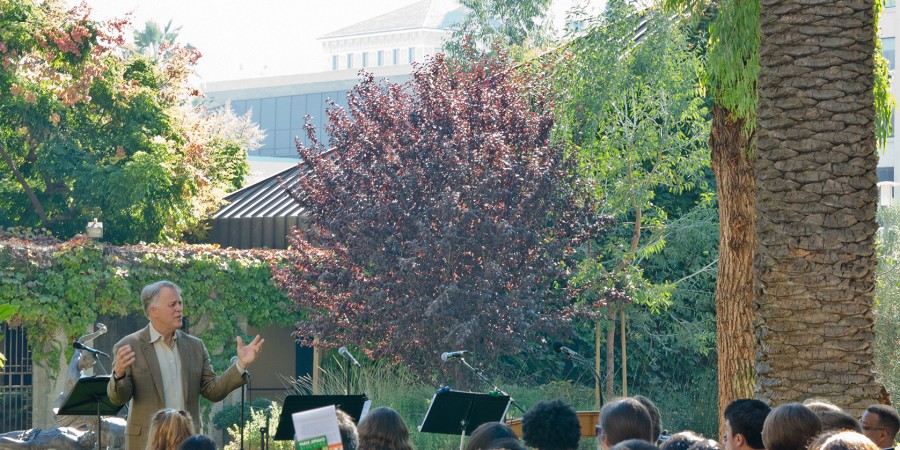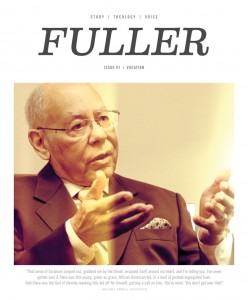
The words continuity and change mark the beginning of my second school year as president of Fuller. A brief glimpse of the world around us shows dramatic change in the cultural landscape near and far; the perplexity of structures and habits of the institutional church; the new experiments and models of church life; the growing interest in church planting and in bivocational ministry; the inspiring rise of immigrant congregations; the large number of our students who intend to put their education to work in some form of service in the public square or in nonprofits, in the arts, or in business; morphing delivery systems for all graduate-level education, seminaries included; an urgent need for training women and men to be leaders who can form leaders for the mission of the church in the world.
Such change outside of Fuller requires change within it. Our curriculum, reimagined from the ground up last year, will move our students forward with a greater intentionality and integration over the course of their education. Alongside them, we want to discern within the community what God is calling us to do in the world—inside the church or beyond it.
If you have received the new FULLER magazine in the mail, you can also receive a gift copy of my new book entitled Called: The Crisis and Promise of Following Jesus Today. In it I attempt to frame the urgent need to recover the central call of every Christian to live as disciples of Jesus. A friend of Fuller’s has made the gift of this book possible with the hope that this central vocation, which grounds all others, will clarify, invigorate, and empower us to be catalysts for new life and transformation.
Call is a word that has many associations, so let me be clear what I mean by it. The heart of God’s call is that we receive and live the love of God for us and for the world. This is the meaning of the two great commandments, that we are made to love the Lord our God with all we are and our neighbors as ourselves. The Bible as a whole, and Jesus in particular, reveals what such a life looks like. Our call is loving communion with God and God’s world, and it encompasses everything.
Vocation doesn’t just mean the pursuit of ordained ministry; it refers to God’s desire for all of our lives. The primary call of God, then, is for us to live for the flourishing of God’s purposes in the world—a foundation that might also include direction to such things as jobs, gifts, relationships, and more.
What is life in this world about? What are we to make of being human? Why are we here? Is there a reason we are alive, and, if so, how do we know what that is? These questions can be prompted by beauty and joy, but we also experience direction in doubt, in pain, in suffering. These questions are personal and practical, requiring that we live honestly and fully before God and our neighbor.
Here is the crisis we face: we’ve been made for this calling, but it slides through our fingers. Jesus-followers live with all the tensions and ambiguities that others do, and we see that love is often more evident in the unchurched than in ourselves. We say we are following Jesus, but what we actually offer instead of his love are buildings, programs, music, classes, token work projects, and budget appeals.
Our high calling of love has become encrusted, buried under layers that lack significant evidence of life. I have been caught in this vortex, well knowing the command of Jesus to live out genuine love in the face of real need.
Just as so many voices claim that the church is dying or irrelevant, so it is our task to make the authentic life and witness of God’s people more evident. We move into a sea of great challenges with confidence (because of our Lord), urgency (because of our mission), and humility (because of our faith). May this FULLER magazine help narrate the stories of how Fuller students, faculty, staff, alumni, trustees, donors, and friends seek to do just this.
Yours in freedom and joy.
Mark Labberton
Las palabras continuidad y cambio marcan el comienzo de mi segundo año escolar como presidente de Fuller. Un breve destello del mundo que nos rodea nos muestra el cambio dramático en el panorama cultural cercano y lejano; la perplejidad de estructuras y hábitos de nuestra iglesia institucional; los nuevos experimentos y modelos de la vida eclesiástica; el creciente interés en plantación de iglesias y en ministerios bivocacionales; el crecimiento sorprendente de congregaciones inmigrantes; el gran número de nuestros estudiantes que pretenden poner en práctica la educación adquirida dentro de alguna forma de servicio en el círculo público o en organizaciones sin fines de lucro, en las artes, en el negocio; una necesidad latente de capacitar mujeres y hombres a ser líderes que puedan formar líderes para la misión de la iglesia en este mundo.
Tal cambio fuera de Fuller requiere un cambio dentro de sí mismo. Nuestro plan de estudios, re-imaginado el año pasado desde abajo hasta arriba, moverá adelante al estudiantado con una mayor intencionalidad e integración a lo largo de su trayectoria educacional. Junto a ellos y ellas, queremos discernir dentro de la comunidad lo que Dios nos está llamando a hacer en este mundo—dentro de la iglesia o más allá de ella.
Si usted ha recibido la nueva revista FULLER en su correo, usted también recibirá como regalo una copia de mi nuevo libro Llamado a Seguir a Jesús Hoy. En este libro trato de enmarcar la necesidad latente de recuperar el llamado central de cada vida cristiana a vivir como discípulos de Jesús. Un amigo de Fuller ha hecho posible este regalo con la esperanza de que este llamado central, que cimienta los demás, llegue a clarificar, vigorizar y adiestrarnos a catalizar una nueva vida y nueva transformación.
“Llamado” es una palabra que tiene muchas connotaciones, por eso permítame aclarar lo que trato de decir. El corazón del llamado de Dios es que recibamos y vivamos el amor de Dios para nosotros y nosotras y para el mundo. Este es el significado de los dos grandes mandamientos, el ser creados para amar a nuestro Señor Dios con todo nuestro ser y a nuestro prójimo como a uno mismo. La biblia en su plenitud, y Jesús en particular, revela lo que esta vida debería ser. Nuestro llamado es una comunión amorosa con Dios y con la creación de Dios y esta abarca todo.
La vocación no sólo significa alcanzar el ministerio ordenado; esta se refiere al anhelo de Dios para todas nuestras vidas. Entonces, el llamado primordial de Dios es que vivamos para el avance de los propósitos de Dios en este mundo—un fundamento que puede que incluya dirección a tales cosas como el trabajo, dones, relaciones y más.
¿De qué se trata la vida en este mundo? ¿Qué significado podemos obtener del hecho de ser humanos? ¿Por qué estamos aquí? ¿Hay una razón por la cual tenemos vida, y si es así, cómo podemos conocer aquella razón? Estas preguntas pueden ser provocadas por belleza y alegría, pero también por experiencias a través de dudas, de dolor y sufrimiento. Estas preguntas son personales y prácticas, requieren que vivamos honestamente y plenamente delante de Dios y de nuestro prójimo.
Esta es la crisis que enfrentamos: se nos creó para este llamado, pero fácilmente se nos escapa por entre los dedos. Las personas que siguen a Jesús viven con todas las tensiones e incertidumbres que los demás, y muchas veces vemos que el amor es más evidente entre la gente que no asiste a la iglesia que entre las personas que siguen a Jesús. Decimos que seguimos a Jesús, pero en vez del amor de Dios, lo que en realidad ofrecemos es edificios, programas, música, clases, proyectos de trabajos simbólicos y propuestas de presupuestos.
Nuestro sumo llamado de amar se ha incrustado, enterrado debajo de muchas capas que carecen de una importante evidencia de vida. Yo me he encontrado en este vórtice, sabiendo claramente el mandato de Jesús de vivir una vida genuina de amor ante la realidad de la verdadera necesidad.
Así como muchas voces reclaman que la iglesia se está muriendo o es irrelevante, de igual forma tenemos la labor de hacer la vida auténtica y el testimonio del pueblo de Dios más evidentes. Con toda confianza (por nuestro Señor), urgencia (por nuestra misión) y humildad (por nuestra fe), nos estamos moviendo hacia un mar de grandes dificultades. Que esta revista FULLER ayude a narrar las historias de cómo el estudiantado, docentes, el personal, ex alumnos(as), fideicomisarios(as), donantes y amistades de Fuller buscan hacer esto.
Atentamente en libertad y gozo.
지속과 변화는 풀러의 총장으로 저의 두번째 해의 시작을 알리는 용어들입니다. 우리 주변의 세상을 언뜻 들여다만 봐도 원근의 문화적 풍경이 극적으로 변화하는 것을 볼 수 있습니다. 제도적 교회의 구조들과 관행들이 주는 당혹감, 교회 생활에 대한 새로운 시도와 모델들, 교회개척과 이중직 사역(bivocational ministry)에 대한 증대되는 관심, 이민교회들의 고무적인 성장, 자신들이 교육받은 바를 가지고 공적 영역 혹은 비영리 단체, 예술, 사업 등의 영역에서 섬기기를 원하는 많은 학생들, 신학교를 포함한 모든 대학원 교육에 있어서의 수업 전달 방식의 변화, 리더들을 잘 준비시켜 세상 속에서 온전히 교회의 사명을 잘 감당할 수 있도록 그리스도인 형제 자매들을 훈련시키는 일에 대한 긴급한 필요 등이 그 예가 될 것입니다.
풀 러 바깥에서 일어나고 있는 이와 같은 변화는 이제 풀러 안에서의 변화를 요청하고 있습니다. 작년에 완전히 새롭게 디자인된 커리큘럼은 우리 학생들이 교육과정에서 보다 목표에 집중하는 방식으로, 통합성을 갖춘 채 전진해 나갈 수 있게끔 이끌어 줄 것입니다. 풀러 공동체 내에서 우리는 학생들과 함께 하나님이 세상에서—교회 안팎에서—우리가 행하도록 부르신 그 소명을 분별하기 원합니다.
이번 풀러 매거진을 우편으로 받으신 분들은 저의 신간 「제일 소명: 세상을 향하는 하나님 백성의 제자도」역시 선물로 받으셨을 것입니다. 이 책에서 저는 예수의 제자로서 모든 그리스도인들이 그 핵심적 부르심을 회복해야만 하는 긴급성을 알리고자 했습니다. 이 책을 선물로 드릴 수 있게 된 것은, 다른 모든 것을 위한 기초가 되는 바로 이 핵심적 부르심 때문에 우리가 보다 분명한 이해를 얻고 활성화 되어 새로운 삶과 변혁을 위한 기폭제가 될 수 있기를 소망하는 풀러의 후원자 한분의 헌신 덕분입니다.
“부르심”은 다양한 의미를 담고 있는 용어이기 때문에 제가 말하려는 바를 좀 더 분명하게 설명하고자 합니다. 하나님의 부르심의 핵심은 우리 각자가 우리 자신과 세상을 향한 하나님의 사랑을 받고 실제로 그 사랑 안에서 살아가는 데 있습니다. 이것은 성경이 말하는 두 계명, 곧 우리가 우리의 모든 것을 다해 주 우리 하나님을 사랑하고 우리의 이웃을 우리 자신과 같이 사랑해야 한다는 이중사랑의 계명의 의미입니다. 성경 전체는, 특별히 예수님은, 이와 같은 삶이 어떤 것인지를 보여주고 있습니다. 우리를 향한 하나님의 부르심은 하나님과 하나님이 지으신 세상과 사랑으로 연합을 이루는 것입니다. 이와 같은 부르심은 모든 것을 포괄합니다.
소명은 단순히 안수 받은 목회자로서의 사역을 추구하는 것만을 의미하지 않습니다. 소명은 우리 삶 전부에 대한 하나님의 갈망을 의미합니다. 따라서, 우리를 향한 하나님의 가장 으뜸되는 부르심은 세상에서 하나님의 목적들을 온전히 이루기 위해 살아가는 것입니다. 이 부르심은 우리의 직업, 은사, 관계 등이 가야할 방향 역시 포함하는 토대가 될 것입니다.
이 세상에서의 삶이란 과연 어떤 것일까요? 인간으로 살아간다는 것은 무엇을 의미할까요? 우리는 왜 여기에 있습니까? 우리가 살아 있는 이유가 있다면, 그 이유를 과연 어떻게 알 수 있을까요? 이 질문들은 아름다움과 기쁨의 경험 때문에 하게 되기도 하지만, 의심과 고통 가운데서도 하게 되기도 합니다. 이 질문들은 개인적이고 실제적인 질문으로, 우리가 하나님과 우리의 이웃 앞에서 정직하고 온전히 살아가야 함을 일깨워 줍니다.
우리가 직면한 위기는 바로 이것입니다. 우리가 이러한 부르심을 위해 지음받았지만, 그 부르심은 이내 우리의 손가락 사이로 미끄러져 내린다는 것입니다. 예수님을 따르는 이들은 세상의 다른 사람들과 마찬가지로 긴장과 모호함 가운데 살아가고 있고, 때론 사랑의 실천이 우리 믿는 사람들이 아닌 교회 밖 사람들에게서 보다 현저히 드러나는 것을 목격하기도 합니다. 우리는 스스로 예수님의 제자라고 자부하지만, 우리가 세상에 실제로 보여주는 것은 예수의 사랑이 아니라 건물과 프로그램, 음악, 교실, 선심사업 프로젝트, 예산 등이 되곤 합니다.
사랑에 대한 숭고한 부르심은 겹겹이 덮여진 외피 속에 실제적인 삶의 증거도 없이 파묻혀 있습니다. 저 역시 실제적인 필요에 처한 이웃에게 참된 사랑을 실천하며 살도록 부르신 예수님의 계명을 잘 알고 있음에도 불구하고 이같은 소용돌이 앞에 꼼짝달싹 못하고 붙잡혀 있었습니다.
오늘 날 많은 사람들이 교회가 죽어가고 있고 적실성을 잃었다고 주장합니다. 바로 그렇기 때문에 하나님의 사람들의 진정성 있는 삶과 증거가 더욱 명백하게 드러나도록 만들어야 하는 것이 우리의 사명입니다. 우리는 거대한 도전의 바다로 (우리 주님 때문에) 확신을 갖고, (우리의 사명이기 때문에) 긴급성을 예민하게 인식하면서, (우리의 믿음 때문에) 겸손하게 나아가야 합니다. 이번 풀러 매거진이 풀러의 학생들과 교수들, 스텝들, 동문들, 이사들, 기부자들, 기타 후원자들이 어떻게 이러한 부르심에 답하며 살아가는지 그 이야기를 풀어나가는 데 도움이 되기를 바랍니다.
자유와 기쁨 안에서


